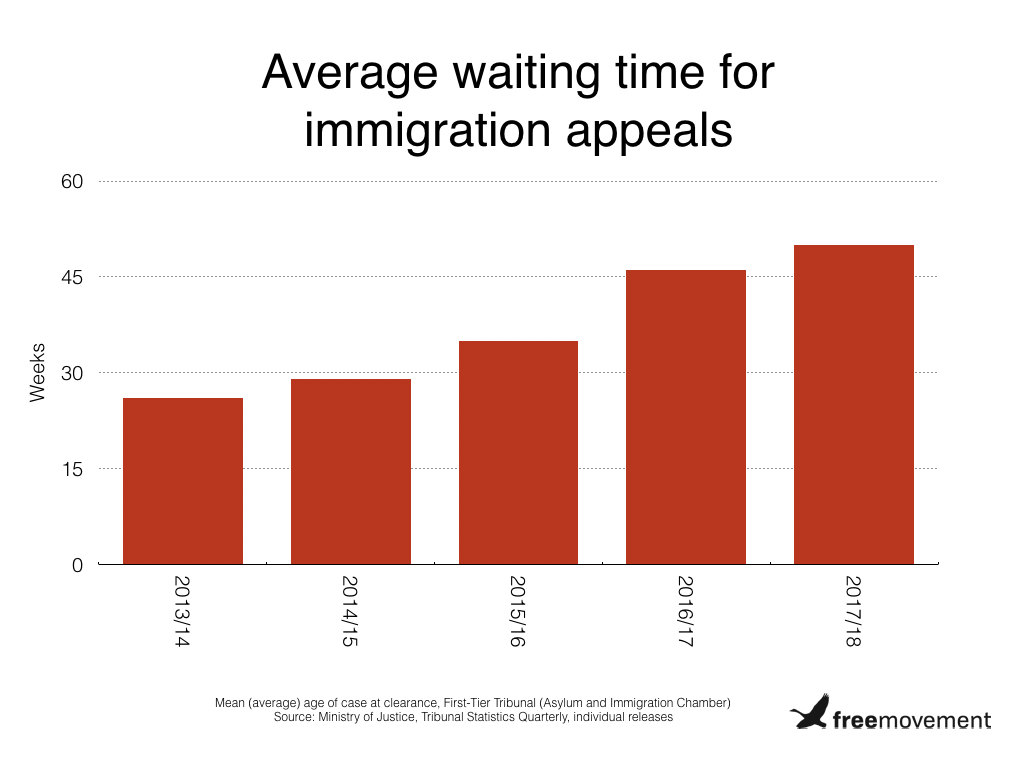- BY CJ McKinney

Home Office reviewing decisions in all immigration appeals over 20 weeks old
THANKS FOR READING
Older content is locked

A great deal of time and effort goes into producing the information on Free Movement, become a member of Free Movement to get unlimited access to all articles, and much, much more
TAKE FREE MOVEMENT FURTHER
By becoming a member of Free Movement, you not only support the hard-work that goes into maintaining the website, but get access to premium features;
- Single login for personal use
- FREE downloads of Free Movement ebooks
- Access to all Free Movement blog content
- Access to all our online training materials
- Access to our busy forums
- Downloadable CPD certificates
Browsing LinkedIn the other day I came across this post by Jacqueline Victor-Mazeli, a barrister at Law Lane Chambers:
Appeal hearings [at the First-tier Tribunal] are presently taking place an average of 12 months after decision. The passage of time can see circumstances or caselaw change as well as see further evidence submitted which was not before the decision maker. With a number of older cases proceeding to appeal it is clear that they do so in an inefficient manner which does not benefit any of the parties involved in proceedings.
The Home Office therefore agreed that a review of cases that are over 20 weeks old will be undertaken. The purpose of the review is to identify cases which are not appropriate to continue to appeal and withdraw those decisions so that they can be remade based on the most up to date information.
News to me, although members of the Immigration Law Practitioners’ Association (ILPA) were told about this review back in May. It applies to all appeals listed from June 2018 onwards that will be over 20 weeks old at date of hearing. That is an awful lot of them, given the inexorable rise in average waiting times.

The review began w/c 14 May and was expected to run for 20 weeks. That means that there should still be time for practitioners who might have been unaware of this review to write in with new evidence where a Home Office decision is particularly poor or has not aged well. ILPA has been provided with a dedicated email address (see previous link).
The Home Office says that the purpose of the review is to avoid unnecessary appeal hearings. A cynic might note that reviewing more stale decisions before they are overturned by an immigration judge will also push down the percentage of cases the department loses on appeal, which has risen to exactly 50%.
Either way, bailing out of unwinnable appeals at the death does nothing to address the underlying issues. Julian Norman of Drystone Chambers points out to me that concessions following barrister review “will of course mean that such cases are not recorded as a win for the appellant”, so “there is a risk that Home Office ‘win rates’ rise despite there being no change to the quality of initial decision making”.
That 50% win rate is calculated by dividing successful appeals by all determined appeals, so excluding appeals that are withdrawn. At present the statistics do not distinguish between an appellant withdrawal and a Home Office withdrawal, so the effect of this initiative looks set to be precisely that — fewer compelling appeals allowed at tribunal, so a lower percentage of appeals lost by the department, even though there might be no change in the number of decisions successfully challenged. Ms Norman suggests that “UKVI must ensure that they are properly recorded as withdrawn by the respondent rather than simply withdrawn”. That would provide a much more accurate picture of Home Office performance.

3 responses
Most relevant reason for the decision to review cases might be that cost are being awarded against the Home Office where they have not reviewed indefensible appeals.
That’s a good point, Rehman, I was going to mention that but was trying to keep the post brief!
My experience is that (currently) that the UK BA aims to list the in-country, say, EEA paper appeal within 6 weeks from the appeal submission date. This is the only change I have noted recently.
I am yet to see the UK BA to withdraw the clearly unjustified refusals…